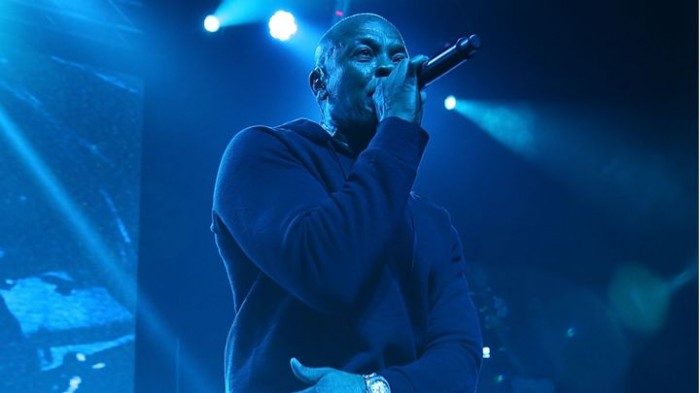
Who in the world has better ears than Andre Young? Throughout his many incarnations, the common thread in Dr. Dre’s career has been his ability to hear things differently from everyone else, and his certitude that millions of paying customers will want to hear those things too. Paradoxically, he’s been both prolific and patient: It doesn’t seem like he’s ever stopped working, and yet somehow 16 years have elapsed since his last solo LP.
For much of that time, he’s said, he was working on a solo record to follow up 1992’s landmark The Chronic and 1999’s lushly raucous 2001. The project — which grew increasingly mythical as time passed — consisted of a title, Detox, and little else. Now, with scant warning, Dre’s solo return is upon us, with the twist that it isn’t Detox at all. Maybe it’s marketing: How could anything meet the wild expectations tied to that name? Or maybe the dream of Detox paralyzed Dre, and the only way to free himself was to set his sights elsewhere.
So he set them on his past. Compton is a companion piece to the new N.W.A biopic, and the album’s backward gaze is evident from the intro, where narration from an old TV documentary describes how Dre’s California hometown went from black-middle-class idyll to a crime-ravaged “extension of the inner city.” Dre reminisces over past indignities (“Face down on the pavement with the billy clubs . . .”) and glories (“. . . Now it’s ‘Fuck Tha Police’ all up in the club”) — but this is no dusty museum tour. Compton contains some of his most ambitious, idea-stuffed production ever, combining the layered bombast and narcotic ooze of his catalog’s peaks with a bunch of bold new tricks. On standouts like “Talk About It” and “Genocide,” Dre and his co-producers manage insane juggling acts between throbbing funk bass, jazz trumpet, extended high-hat solos, acoustic guitars and irresistibly pounding drums. Lyrically, Compton is not only vibrant but full of an indignation that suggests world-beating success has done little to lessen the vitriol that fueled Dre back in N.W.A. On “Issues,” co-starring Ice Cube, Dre declares, “Fuck money, that shit could never change me.” The line seems at once boastful and true, for better and worse: The track ends with a jarring fantasy about a woman’s violent murder.
Throughout, Dre’s rhyming (aided as always by co-writers) is impressive. He trades his familiar stentorian boom for double-time syncopations, hoarse snarls and even bursts of song — Eminem and Kendrick Lamar, both of whom cameo, clearly rubbed off on him. The latter in other ways, perhaps: This is Dre’s most explicitly political album, featuring lines from him and guests that evoke police violence, particularly the killings of Michael Brown (“Blood on the cement, black folks grieving”) and Eric Garner (“I can’t breathe, I can’t breathe”). He’s still full of contradictions — on “Animals,” he calls himself a “product of the system, raised on government aid,” but on “Darkside/Gone,” he raps, with palpable disgust, that “anybody complaining about their circumstances lost me, homey.” It adds up to an album by turns confounding and enthralling. It’s no Detox. It’s something realer, and better.
Read more: http://www.rollingstone.com/music/albumreviews/dr-dre-compton-20150806#ixzz3i5Z4Q9NQ
Follow us: @rollingstone on Twitter | RollingStone on Facebook
